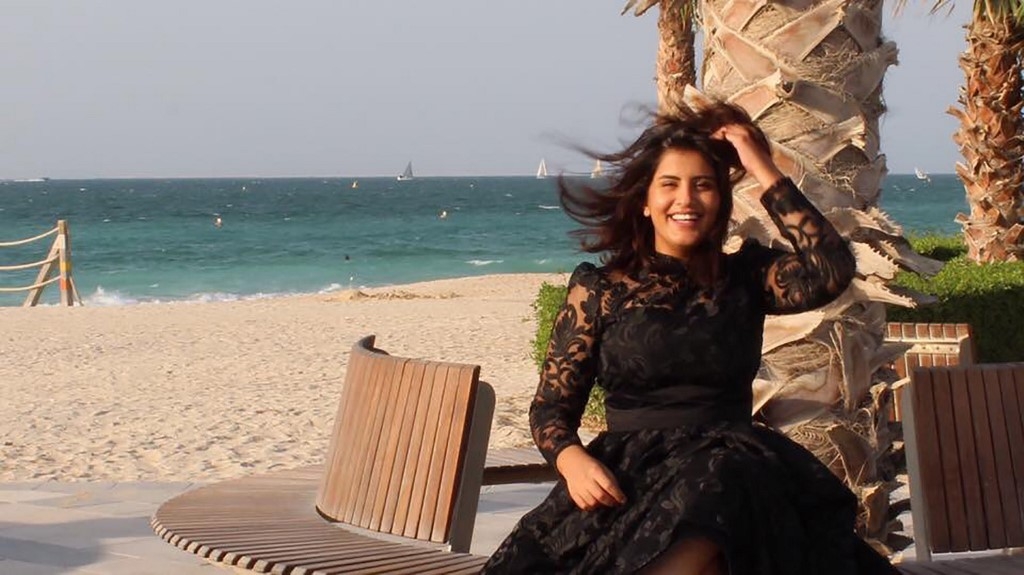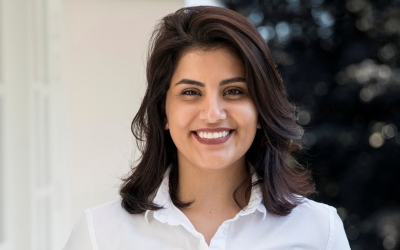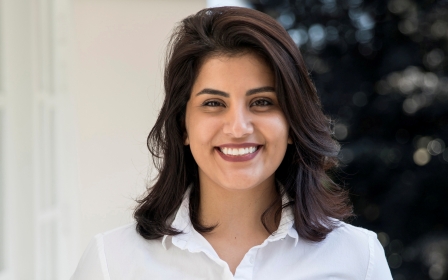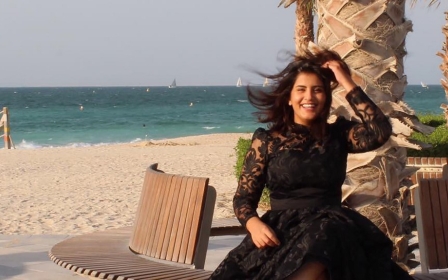Loujain al-Hathloul: Saudi court hands prison sentence to women's rights activist

A Saudi terrorism court on Monday sentenced prominent women's rights activist Loujain al-Hathloul to five years and eight months in prison, in a case that has drawn international criticism from rights groups and governments.
The Specialised Criminal Court suspended two years and 10 months of her sentence "if she does not commit any crime" within the next three years, local media reported.
New MEE newsletter: Jerusalem Dispatch
Sign up to get the latest insights and analysis on Israel-Palestine, alongside Turkey Unpacked and other MEE newsletters
The Riyadh court convicted the 31-year-old under acts that fall under a Saudi law on combating and financing terrorism.
Handing down the judgement, the judge said Hathloul had confessed to the charges without coercion, despite reports that she and other women activists had been tortured by Saudi authorities.
Hathloul broke down in court when she heard the sentence, according to her sister, Lina, and vowed to fight on.
"Loujain cried when she heard the sentence today. After nearly 3 years of arbitrary detention, torture, solitary confinement - they now sentence her and label her a terrorist. Loujain will appeal the sentence and ask for another investigation regarding torture #FreeLoujain," Lina al-Hathloul tweeted.
Mary Laylor, the UN special rapporteur on human rights defenders, tweeted: "She should be immediately released. Defending human rights is not terrorism."
Adam Coogle, deputy director of Middle East and North Africa division at Human Rights Watch, called the sentencing a "travesty of justice".
He tweeted: "Saudi Arabia convicting Loujain Hathloul [between] Xmas and New Years shows they want to minimize attention because they are embarrassed over how they treated her, and they should be. This was always a total charade and travesty of justice."
Given time already served, Hathloul could be released in approximately two months, according to Lina, who added that the court also handed down a five-year travel ban. A motion to appeal the conviction can be filed within 30 days.
'Sham trial'
Hathloul was arrested in May 2018 with about a dozen other women activists just weeks before a historic lifting of a decades-long ban on female drivers - a right she had long campaigned for.
She and other imprisoned activists were charged under the country's anti-cybercrime law on allegations that they “communicated with people and entities hostile to the king”, “cooperated with journalists and media institutions hostile to the king”, “provided financial support to foreign adversaries”, and “recruited persons for information detrimental to the security of the kingdom”.
'The very existence of this sham trial pulls the veil off the authorities’ so-called push for reforms in the kingdom. How can they initiate change in the country when the very women who fought for these reforms are still being punished for it?'
- Amnesty International
In November 2018, just weeks after the murder of Middle East Eye and Washington Post columnist Jamal Khashoggi by a Saudi hit squad in Istanbul, reports emerged of torture committed against Hathloul and other women detainees, including waterboarding, electric shocks and threats of rape.
Amnesty International, which denounced her case as a “sham trial”, has noted that it coincided with the kingdom’s much-touted liberalisation reforms introduced by Crown Prince Mohammed bin Salman.
“The very existence of this sham trial pulls the veil off the authorities’ so-called push for reforms in the kingdom. How can they initiate change in the country when the very women who fought for these reforms are still being punished for it?” Amnesty said.
Despite international outcry and scrutiny, Saudi authorities in November transferred her case to the Specialised Criminal Court, which specialises in handling terrorism cases and is notorious for handing down lengthy prison sentences to dissidents.
'Bunch of tweets'
Hathloul cut an emaciated figure as she appeared in the court in November, having begun a hunger strike the month before.
"She looked weak in court, her body was shaking uncontrollably and her voice was faint and shaky,” her sister Lina Hathloul wrote on Twitter.
During a 16 December hearing, a Saudi public prosecutor cited tweets posted by Hathloul about a campaign to let women drive and the kingdom's guardianship system as evidence against the jailed rights activist.
Mohammed bin Salman had previously claimed that there were videos of Hathloul proving she worked as a spy. But Hathloul's brother Walid noted that no such evidence was presented.
"No evidences were provided that are related to providing information to foreign hostile, recruiting people in sensitive positions," Walid tweeted.
"All they have are a bunch of tweets that they did not like."
The continued detention of Hathloul, who was nominated for the Nobel Prize earlier this year, has prompted a global outcry, with the kingdom receiving a rare rebuke from 30 countries before the UN Human Rights Council in September.
'The authorities wanted to make an example of her and show to anyone who dares to speak up that they will pay with their freedom'
-Ines Osman, director, MENA Rights group
Earlier this month, Elizabeth Broderick, chair of the United Nations working group on discrimination against women and girls, called on Saudi Arabia to “immediately” release Hathloul, and called the charges against her “spurious”.
Ines Osman, director of MENA Rights groups, said that Hathloul’s sentencing showed that the authorities were attempting to make an example out of her.
“Loujain’s appalling sentencing, despite the heavy pressure to release her, illustrates the authorities’ bluntness in repressing any dissenting voices in Saudi Arabia,” Osman said in a statement to Middle East Eye.
“The authorities wanted to make an example of her and show to anyone who dares to speak up that they will pay with their freedom."
Osman said the fight for Hathloul's release will not stop.
"And I hope her sentencing will also be a wake-up call for those who shamelessly took part in the authorities’ whitewashing exercise, whether foreign states, businesses or celebrities," she added.
“Their silence is complicity to the crimes of the Saudi regime.”
Middle East Eye delivers independent and unrivalled coverage and analysis of the Middle East, North Africa and beyond. To learn more about republishing this content and the associated fees, please fill out this form. More about MEE can be found here.





